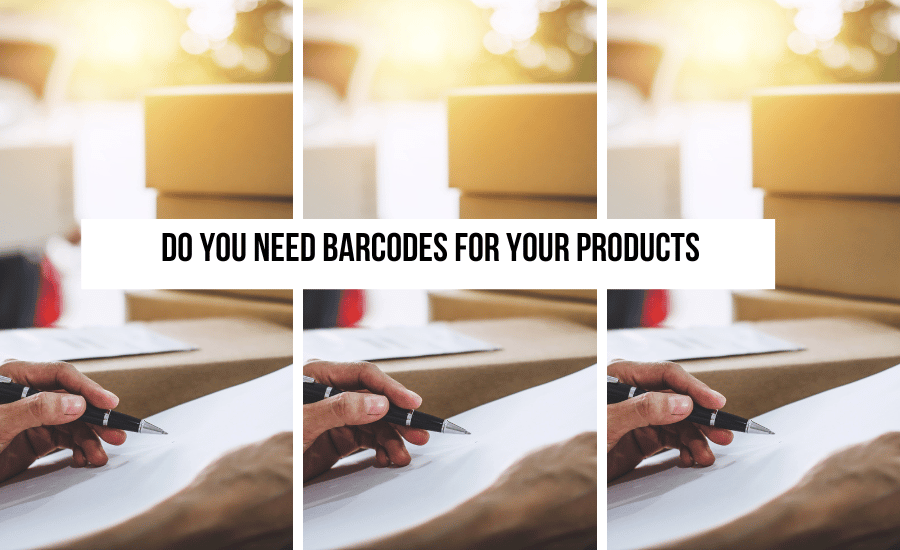Are you a business owner wondering if do you need barcodes for your products? In today’s fast-paced and competitive market, having barcodes can be a game-changer for your business. Barcodes are not just a series of lines and numbers; they are powerful tools that can streamline your inventory management, improve customer experience, and boost your sales.
With barcodes, you can easily track your products, manage stock levels, and reduce human error in data entry. Moreover, barcodes enable faster and more accurate checkout processes, saving valuable time for both your customers and staff. Whether you have a small boutique or a large retail chain, barcodes can help you stay organized, improve efficiency, and provide a seamless shopping experience for your customers. In this article, we will explore the benefits of using barcodes for your products and why they are essential for any business looking to thrive in today’s digital age.

This blog post is all about tje topic do you need barcodes for your products.
Home > Ecommerce Tips > Do You Need Barcodes For Your Products
DISCLOSURE: This is a sponsored post. Through my links, I may receive a commission if you decide to make purchases at no cost for yourself! Check out our disclaimer for more info on how it works.
Ready to embark on your Etsy business journey but unsure of where to begin? Join our free masterclass, where we empower you to start, manage, and scale your Etsy business into a full-time income. With our guidance, 9,000+ individuals have found success, even without a social media presence or email list. Step into the world of Etsy entrepreneurship, and let us guide you to success. Join us now!
Table of contents
- Do need barcodes for your products
- How Barcodes Work
- Types of Barcodes
- Benefits of Using Barcodes for Your Products
- Legal Requirements for Using Barcodes
- Barcode Generation and Printing Options
- Implementing Barcode Systems in Your Business
- Choosing the Right Barcode Solution for Your Products
- Final Thoughts: Do You Need Barcodes For Your Products
- Ready To Start An Etsy Business?
- New On The Blog
Do need barcodes for your products
Product identification is a crucial aspect of any business. Whether you are a manufacturer, distributor, or retailer, being able to identify your products accurately is essential for efficient operations. Barcodes provide a unique identifier for each product, allowing you to keep track of inventory, manage stock levels, and monitor sales. With barcodes, you can easily scan and update product information, eliminating the need for manual data entry and reducing the risk of errors. This not only saves time but also ensures that your inventory records are always up to date. Whether you are shipping products to customers or restocking your shelves, barcodes make the process faster and more accurate.
Furthermore, barcodes enable better traceability and accountability. If a product needs to be recalled or if there are any quality issues, having barcodes makes it easier to identify and locate the affected items. This not only helps you take prompt action but also ensures the safety and satisfaction of your customers. By using barcodes for product identification, you can improve the overall efficiency of your operations and enhance customer trust in your brand. Let’s further discuss do need barcodes for your products.
How Barcodes Work
Barcodes are machine-readable symbols that represent data in a visual form. They consist of a series of parallel lines and numbers that can be scanned by a barcode reader. The lines of the barcode represent the encoded data, while the numbers serve as a reference for the scanner. When a barcode is scanned, the reader decodes the information and matches it with the corresponding product in the database. This allows for quick and accurate identification of products, making tasks such as inventory management and checkout processes much more efficient.
Barcodes work based on the principle of Optical Character Recognition (OCR). The barcode reader uses a light source, such as a laser or LED, to illuminate the barcode. The reflected light is then captured by a photosensitive sensor, which converts it into an electrical signal. This signal is then processed by the barcode reader, which decodes the information and sends it to the connected system. The system can be a point of sale (POS) terminal, an inventory management software, or any other application that requires product identification. The entire process is quick, reliable, and requires minimal human intervention.
Types of Barcodes
There are several types of barcodes available, each designed for specific applications and industries. The most commonly used barcode symbologies include:
1. UPC (Universal Product Code): UPC barcodes are widely used in the retail industry and are typically found on consumer products. They consist of twelve numeric digits and are used for product identification and inventory management.
2. EAN (European Article Numbering): EAN barcodes are similar to UPC barcodes but are used primarily in Europe. They also consist of twelve numeric digits and are used for product identification and inventory management.
3. Code 39: Code 39 barcodes are alphanumeric and can encode uppercase letters, numbers, and a few special characters. They are widely used in industrial applications, such as asset tracking and logistics.
4. Code 128: Code 128 barcodes can encode a larger set of characters, including both uppercase and lowercase letters, numbers, and special characters. They are commonly used in the shipping and packaging industry.
5. QR Codes: QR codes are two-dimensional barcodes that can store a large amount of data, including text, URLs, and contact information. They are commonly used in marketing and advertising to provide additional information to customers.
The type of barcode you choose will depend on your specific requirements and the industry you operate in. It is essential to consider factors such as the amount of data you need to encode, the scanning distance, and the compatibility with existing systems.
Benefits of Using Barcodes for Your Products
Using barcodes for your products can bring several benefits to your business:
1. Improved Efficiency: Barcodes streamline processes such as inventory management, stocktaking, and checkout, saving time and reducing errors. With barcodes, you can quickly scan products, update information, and track inventory levels in real-time.
2. Accurate Data Entry: Manual data entry is prone to errors, which can lead to costly mistakes and discrepancies in inventory records. Barcodes eliminate the need for manual entry, ensuring that the information is accurate and up to date.
3. Faster Checkout: Barcodes enable faster and more accurate checkout processes, reducing waiting times for customers and improving their overall shopping experience. Scanning barcodes is quicker than manually entering product codes or prices.
4. Improved Inventory Management: Barcodes make it easier to track and manage inventory levels. You can quickly identify low stock items, reorder products, and keep track of product movement across different locations.
5. Enhanced Customer Experience: By using barcodes, you can provide a seamless shopping experience for your customers. They can easily find the products they are looking for, and the checkout process is fast and efficient.
6. Better Traceability: Barcodes enable better traceability of products, making it easier to identify and locate specific items. This is particularly important in industries where product recalls or quality issues may arise.
7. Data Analytics: With barcodes, you can collect valuable data about your products, such as sales trends, customer preferences, and inventory turnover. This data can help you make informed business decisions and optimize your operations.
Legal Requirements for Using Barcodes
While using barcodes for your products is not legally required in most countries, some industries have specific regulations and standards that you need to adhere to. For example, if you are selling products in the healthcare or pharmaceutical industry, you might need to comply with specific barcode labeling requirements. It is essential to research and understand the regulations applicable to your industry to ensure compliance and avoid any legal issues.
Furthermore, if you plan to sell your products through retailers or online marketplaces, they may have their own barcode requirements. Retailers often require products to have barcodes for efficient inventory management and point of sale processes. It is crucial to check with your retail partners or online platforms to understand their barcode requirements and ensure that your products are properly labeled.
Barcode Generation and Printing Options
Generating and printing barcodes for your products can be done in various ways, depending on your needs and budget. Here are some options to consider:
1. Barcode Generator Software: Barcode generator software allows you to create barcodes digitally and print them as needed. These software applications support various barcode symbologies and offer customization options, such as adding logos or changing colors.
2. Barcode Printing Services: If you have a large number of products or require high-quality barcode labels, you can outsource the printing to barcode printing services. These services specialize in printing barcodes on different materials, such as adhesive labels or tags.
3. Barcode Label Printers: Barcode label printers are dedicated devices that can print barcodes directly on labels or tags. These printers are available in different sizes and printing technologies, such as thermal transfer or direct thermal.
4. Mobile Apps: There are also mobile apps available that allow you to generate barcodes directly on your smartphone. These apps are convenient for small businesses or when you need to generate barcodes on the go.
The option you choose will depend on factors such as the volume of products, the desired quality of barcodes, and your budget. It is essential to select a reliable and reputable solution to ensure the accuracy and readability of the barcodes.
Implementing Barcode Systems in Your Business
Implementing barcode systems in your business involves more than just generating and printing barcodes. It requires integrating barcodes into your existing processes and systems to maximize their benefits. Here are some steps to consider when implementing barcode systems:
1. Identify your needs: Determine how barcodes can help streamline your operations and improve efficiency. Identify the areas where barcodes can bring the most significant benefits, such as inventory management or order fulfillment.
2. Select the right barcode solution: Choose the barcode symbology that best suits your products and industry. Consider factors such as the amount of data you need to encode, the scanning distance, and the compatibility with existing systems.
3. Integrate with existing systems: Barcode systems should seamlessly integrate with your existing software applications, such as inventory management or point of sale systems. Ensure that the barcode data can be easily captured, processed, and shared across different platforms.
4. Train your staff: Provide training to your staff to ensure they understand how to generate, scan, and interpret barcodes correctly. This will help avoid errors and ensure the smooth implementation of barcode systems.
5. Test and optimize: Test the barcode systems thoroughly to ensure they meet your requirements and perform as expected. Monitor the performance and gather feedback from your staff to identify any areas for improvement.
Remember that implementing barcode systems is an ongoing process. Regularly review and optimize your barcode systems to ensure they continue to meet your business needs and adapt to any changes in your operations.
Choosing the Right Barcode Solution for Your Products
Choosing the right barcode solution for your products is crucial to ensure effective product identification and seamless operations. Here are some factors to consider when selecting a barcode solution:
1. Product Type: Consider the characteristics of your products, such as size, shape, and material. Some barcode symbologies may be better suited for specific product types or packaging.
2. Industry Standards: Research the barcode standards and regulations applicable to your industry. Some industries, such as healthcare or food, may have specific requirements for barcode labeling.
3. System Compatibility: Ensure that the barcode solution you choose is compatible with your existing systems, such as inventory management or point of sale software. This will ensure smooth integration and data exchange.
4. Scalability: Consider the future growth of your business and whether the chosen barcode solution can accommodate your expanding operations. It is essential to choose a solution that can scale with your business needs.
5. Budget: Evaluate the cost of implementing the barcode solution, including the initial setup, barcode generation, and printing. Consider the long-term benefits and return on investment to make an informed decision.
It is recommended to consult with barcode solution providers or industry experts to ensure you choose the most suitable solution for your business.
Final Thoughts: Do You Need Barcodes For Your Products
In today’s digital age, barcodes have become essential for businesses of all sizes and industries. They offer numerous benefits, including improved efficiency, accurate data entry, faster checkout processes, and better inventory management. Barcodes enable businesses to streamline operations, reduce errors, and enhance the overall customer experience. Whether you have a small boutique or a large retail chain, implementing barcode systems can help you stay organized, improve efficiency, and thrive in today’s competitive market.
So, if you are a business owner wondering if you need barcodes for your products, the answer is a resounding yes. Embrace the power of barcodes and unlock the full potential of your business. This blog post was all about do need barcodes for your products. If you have questions, please drop then below.
Ready To Start An Etsy Business?
If you’re considering starting your own Etsy store but unsure about which products to offer, my signature course, the Etsy Mastery Course, is your ultimate guide. Learn how to start, manage, and scale your Etsy business to a full-time income.


+ show Comments
- Hide Comments
add a comment